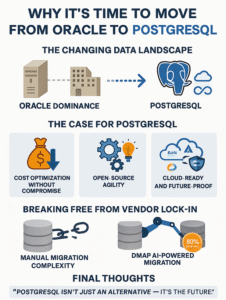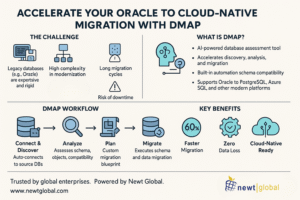CEO Talks: Why It’s Time to Move from Oracle to PostgreSQL
By Neeta Goel, CEO – Newt Global
The Changing Data Landscape
For decades, Oracle has been the backbone of enterprise databases. Its reliability, scalability, and enterprise-grade features made it the default choice for mission-critical applications.
But over the past decade, the data landscape has changed dramatically. The rise of open-source platforms, cloud-native architectures, and agile delivery models has reshaped how organizations think about their database strategy.
PostgreSQL—an advanced, open-source relational database—has emerged as a preferred choice for enterprises seeking flexibility, cost efficiency, and innovation. Around the world, organizations are discovering that PostgreSQL not only matches but often exceeds proprietary databases in performance, security, and extensibility.

The Case for PostgreSQL
Cost Optimization Without Compromise
Oracle’s licensing model is well-known for its complexity and cost. PostgreSQL offers a license-free model, reducing total cost of ownership without sacrificing enterprise-grade capabilities or performance.
Open-Source Agility
With PostgreSQL, enterprises control their own pace of innovation. A rich ecosystem of extensions, tools, and community support enables faster adaptation without being tied to a single vendor’s roadmap.
Cloud-Ready and Future-Proof
PostgreSQL runs natively on all major cloud platforms—AWS, Azure, and Google Cloud—making hybrid and multi-cloud strategies straightforward. Proprietary platforms, by contrast, often introduce constraints that slow down cloud adoption.
Feature-Rich and Enterprise-Grade
From advanced indexing and JSON support to foreign data wrappers and robust security, PostgreSQL handles a wide range of workloads, from transactional systems to advanced analytics.
Breaking Free from Vendor Lock-In
Vendor lock-in limits strategic flexibility. Renewal costs, licensing restrictions, and rigid upgrade paths can slow innovation. Migrating to PostgreSQL removes these barriers, giving enterprises more control over their data strategy and technology stack.
At Newt Global, we have seen first-hand how liberating it is for organizations to move from being at the mercy of annual price hikes to having complete control over their database evolution.
The Migration Challenge — and Opportunity
The advantages of PostgreSQL are clear, but migration from Oracle is not a simple lift-and-shift. It requires careful planning, deep code and data analysis, and the right expertise to ensure zero data loss, minimal downtime, and application compatibility.
DMAP: Accelerating the Journey

This is where DMAP—our AI-Powered Migration Platform—becomes a key enabler. DMAP automates up to 80% of migration tasks, performs deep code analysis, and ensures a smooth transition from Oracle to PostgreSQL with speed, precision, and minimal disruption.
Read 2 mins : Oracle to Azure PostgreSQL Migration | Fortune 500 Case Study
Real-World Impact
A global telecom company reduced database costs by 70% and halved deployment times after migrating with DMAP.
A leading bank achieved full cloud-native readiness in under six months—a process that would have taken over a year with a manual approach.
Final Thoughts
As leaders, our responsibility is not only to manage the present but to prepare for the future. The shift from Oracle to PostgreSQL is more than a cost-saving exercise—it’s a strategic move towards agility, innovation, and independence.
The question is no longer “Should we move?” but “How quickly can we move?”
At Newt Global, we are committed to helping enterprises make this transition with confidence, speed, and minimal disruption. The time to act is now. PostgreSQL isn’t just an alternative—it’s the future.”
Get Start for Free – Book a Demo – Book a Call – Newt Global Consulting LLC
